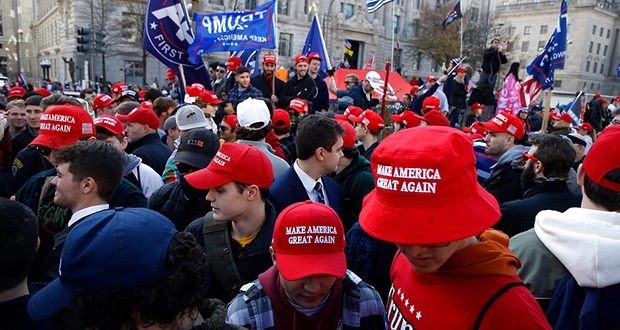
The plaintiff claims the defendants were not shy about expressing their support for views he connected to the ‘MAGA movement.’ (Sipa USA via AP)
A habit of discriminatory language could help an employee’s claim of a hostile work environment when generalized harassment is coupled with more specific ties to an employee’s protected class, a Massachusetts trial court judge has decided.
In the case of Brzuchalski v. Digital Guard, LLC, the plaintiff alleged that his coworkers discriminated against him and another Jewish employee, and that the company’s response was insufficient. He also claimed that the company owed him commissions and that the company retaliated over severance negotiations.
Plaintiff Joshua Brzuchalski, who is Jewish, alleges that three coworkers regularly harassed and intimidated him. Specific allegations with ties to Brzuchalski’s faith include a loud conversation in which two coworkers discussed their belief that Mel Gibson was “railroaded by the cops” over the actor’s DUI arrest and widely publicized anti-Semitic rant.
In another instance, one of the allegedly harassing employees reportedly told the team’s only other Jewish employee, “I just don’t like his kind. I know his type. I don’t trust him, and he is shifty,” speaking of Brzuchalski.
The alleged ringleader was an employee who wore a “Make America Great Again” hat and displayed a poster of former President Donald Trump and a “Don’t Tread on Me” flag in his cubicle. Brzuchalski claims that this employee, and two others, made other offensive statements against Native Americans and expressed intolerance for Jews as well as Black Lives Matter supporters, immigrants, and diversity issues.
The defendants requested a summary dismissal, arguing that the allegations were insufficiently tied to the plaintiff’s religion. But the judge found that at least some of the conduct was tied to the plaintiff’s faith and that other harassment and offensive language could be considered in assessing a hostile work environment claim.
Complaints and termination
Brzuchalski made at least five reports of discrimination over a five-year period. After his third complaint, he was granted temporary permission to work from home. When he was ordered back to the office, however, he found his workspace had been relocated to a room the size of a “very small closet.” Soon after, he was asked to meet with the company’s general counsel, who suggested he accept a severance package.
Brzuchalski filed a charge of discrimination with the Massachusetts Commission Against Discrimination (MCAD) and the Equal Employment Opportunity Commission (EEOC) and notified his employer. During negotiations over his severance package, Brzuchalski was terminated.
Takeaways
First Amendment rights to free speech are not protected in a private work environment. Employers should consider whether permitting politically-connected speech and displays could increase risk. It’s possible that future plaintiffs and counsel will argue that public support of certain political movements could be interpreted as a motivating factor in offensive, harassing behavior.
 New England Biz Law Update
New England Biz Law Update
